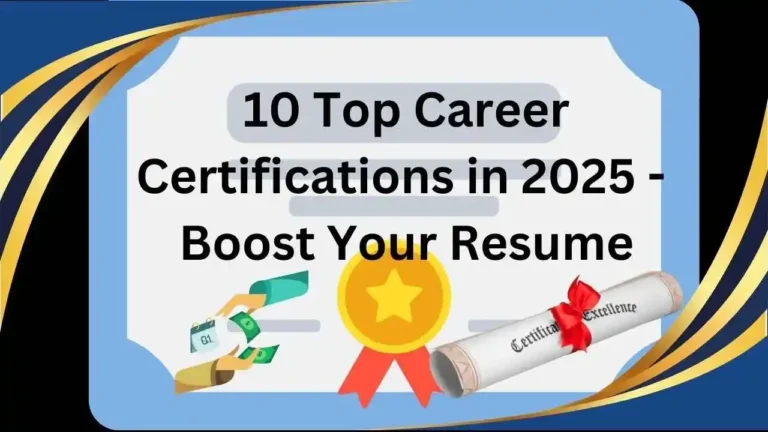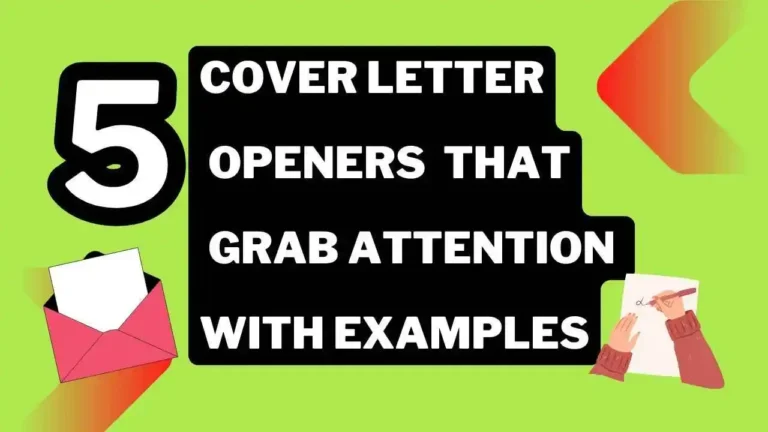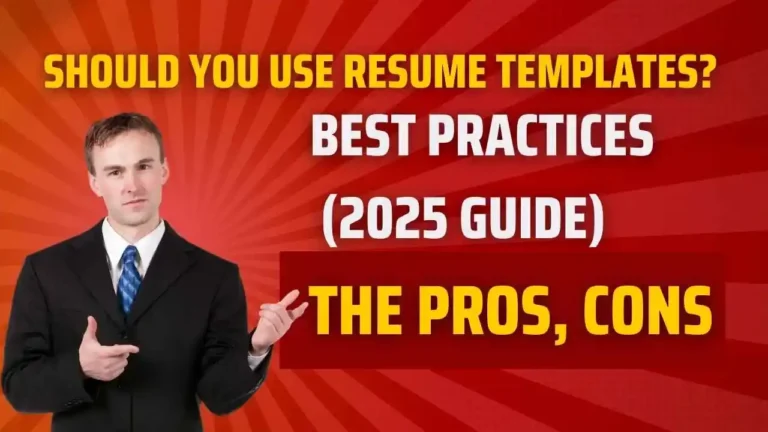Understanding yourself is essential for making informed life decisions, whether it’s selecting a career, building strong relationships, or setting meaningful goals. Knowing how to define your interests, abilities, values, and personality allows you to make choices that truly reflect who you are. By gaining clarity about yourself, you can identify opportunities that align with your strengths and passions, leading to greater fulfillment and success.
In this guide, we’ll explore five powerful methods that offer a structured approach to self-discovery. These techniques, widely used by career experts, psychologists, and self-improvement coaches, help individuals recognize their potential and make choices that align with their authentic selves. Whether you’re seeking career direction or personal growth, these strategies will provide valuable insights into what truly drives and motivates you. Let’s dive into the process of uncovering your true self!
Read also: Should You Use Resume Templates? The Pros, Cons & Best Practices (2025 Guide)
Table of Contents
1. The Holland Code Method (RIASEC Model) – Defining Your Interests
What is the Holland Code?
The Holland Code, also known as the RIASEC Model, was developed by psychologist John L. Holland. It classifies people into six personality types based on their interests and preferred activities. These six types are:
- Realistic (Doers) – Enjoys hands-on work, using tools, and working with machines (e.g., engineers, mechanics, construction workers).
- Investigative (Thinkers) – Loves solving problems, researching, and analyzing data (e.g., scientists, researchers, analysts).
- Artistic (Creators) – Prefers creative expression, design, and originality (e.g., artists, writers, musicians).
- Social (Helpers) – Enjoys helping others, teaching, and community service (e.g., teachers, social workers, therapists).
- Enterprising (Persuaders) – Thrives in leadership, sales, and business roles (e.g., entrepreneurs, marketers, politicians).
- Conventional (Organizers) – Values structure, organization, and data management (e.g., accountants, administrators, data analysts).
How to Apply the Holland Code to Your Life
- Take an online Holland Code assessment to find out your dominant personality type.
- Identify careers and hobbies that match your personality type and explore them.
- Experiment with activities related to your top 2-3 personality types to see what truly excites you.
By understanding your Holland Code, you can choose career paths, hobbies, and activities that align with your natural preferences.
Your interests define what excites you, motivates you, and keeps you engaged for hours without feeling drained. They play a crucial role in job satisfaction, personal fulfillment, and happiness.
Why Your Interests Matter?
- Guide career planning and help you choose a profession that excites you.
- Increase motivation by aligning your daily tasks with what you love.
- Lead to personal and professional growth, making learning enjoyable.
How to Identify Your Interests?
🔹 Reflect on Past Enjoyable Experiences
- Think about hobbies, school subjects, or work tasks that excited you.
- Ask yourself: What do I do in my free time that makes me happy?
🔹 Take Career Interest Assessments
- Tools like the O*NET Interest Profiler or Holland Code Career Test help identify interest areas.
- Results categorize interests into six types (Realistic, Investigative, Artistic, Social, Enterprising, and Conventional).
🔹 Experiment with New Activities
- Try different hobbies, volunteer work, or learning new skills.
- Engage in free online courses on platforms like Coursera, Udemy, or LinkedIn Learning to explore new fields.
🔹 Observe What Keeps You Engaged
- What type of content do you consume the most?
- What conversations do you love having?
📌 Example: If you enjoy solving problems, analyzing data, and working with technology, your interests may align with IT, analytics, or problem-solving roles.
2. The SWOT Analysis Approach – Assessing Your Abilities
What is SWOT Analysis?
A SWOT analysis (Strengths, Weaknesses, Opportunities, and Threats) is a strategic planning tool commonly used in business, but it’s equally effective for self-assessment.
How to Conduct a Personal SWOT Analysis
- Strengths: Identify what you excel at (e.g., problem-solving, leadership, creativity).
- Weaknesses: Recognize areas that need improvement (e.g., time management, technical skills).
- Opportunities: Look for growth opportunities (e.g., courses, networking, job openings).
- Threats: Identify challenges that might hinder your growth (e.g., competition, lack of resources).
Example Personal SWOT Analysis
| Strengths | Weaknesses |
|---|---|
| Excellent communicator | Struggles with time management |
| Strong analytical skills | Limited coding knowledge |
| Opportunities | Threats |
|---|---|
| Free online courses to improve coding skills | Competitive job market |
| Networking events to meet industry professionals | Industry automation replacing jobs |
How to Use SWOT Analysis for Growth
- Capitalize on your strengths to advance in your career.
- Work on your weaknesses by learning new skills.
- Seize opportunities that align with your abilities.
- Mitigate threats by preparing in advance.
How to Identify Your Abilities?
🔹 Perform a Personal SWOT Analysis
- Strengths – What are you naturally good at?
- Weaknesses – What areas need improvement?
- Opportunities – What skills can you develop for career growth?
- Threats – What obstacles prevent you from improving?
🔹 Take Skills Assessment Tests
- Use platforms like Indeed Skills Test to evaluate job-related skills.
- LinkedIn Skill Assessments help gauge technical and soft skills.
🔹 Seek Constructive Feedback
- Ask mentors, colleagues, or family members what they think you excel at.
- Join peer review groups or coaching programs to gain external perspectives.
🔹 Track Your Achievements
- Make a list of challenges you’ve overcome at work or in personal life.
- Identify patterns in your strengths and problem-solving abilities.
📌 Example: If you consistently lead successful projects, have strong organizational skills, and guide team members, you likely have leadership and project management abilities.
3. The Values Clarification Technique – Understanding What Drives You
Why Are Values Important?
Your values define what truly matters to you in life. They guide your decisions, shape your relationships, and influence your career choices. Examples of values include honesty, independence, creativity, security, and adventure.
How to Discover Your Core Values
- Take a Values Assessment
- Use the Personal Values Assessment to pinpoint your top values.
- 🔹 Reflect on Past Decisions
- What principles guided your biggest life choices?
- Were they based on security, freedom, creativity, or social impact?
- 🔹 Create a Values List
- Write down things you cannot compromise on (e.g., honesty, independence, creativity, teamwork).
- 🔹 Rank Your Values
- Prioritize them from most to least important.
- 📌 Example: If you highly value creativity and independence, a corporate job with rigid rules may not satisfy you, whereas entrepreneurship or freelancing might be a better fit.
Applying Values to Decision-Making
If your top values are freedom and creativity, then a rigid corporate job may not be fulfilling for you. Instead, careers in entrepreneurship, art, or freelancing might be better suited.
4. The Big Five Personality Traits Model – Knowing Yourself Better
What Are the Big Five Traits?
Psychologists categorize personality into five broad traits:
- Openness – Creativity, curiosity, willingness to try new things.
- Conscientiousness – Organization, responsibility, self-discipline.
- Extraversion – Sociability, enthusiasm, assertiveness.
- Agreeableness – Compassion, cooperation, friendliness.
- Neuroticism – Emotional stability, stress management.
How to Use the Big Five for Self-Improvement
- Take a Big Five personality test online.
- Compare your results with your career and personal choices to see alignment.
- Work on areas that need improvement, such as developing self-discipline if you score low on conscientiousness.
How to Discover Your Personality?
🔹 Take a Personality Test
🔹 Observe Your Social Interactions
- Do you gain energy from socializing (extrovert) or alone time (introvert)?
- Do you prefer structured plans or spontaneity?
🔹 Analyze Work Preferences
- Do you thrive in teamwork or work better alone?
📌 Example: If you’re an introverted problem solver, a research-based job might be ideal, whereas extroverted individuals might thrive in sales, marketing, or leadership roles.
5. The Ikigai Framework – Finding Your True Purpose
What is Ikigai?
Ikigai is a Japanese concept meaning “reason for being.” It is the intersection of four elements:
- What you love (passion)
- What you are good at (profession)
- What the world needs (mission)
- What you can be paid for (vocation)
How to Discover Your Ikigai?
- List What You Love Doing (Interests & Passions)
- Identify Your Strengths (Abilities & Skills)
- Analyze What the World Needs (Societal Contribution)
- Find What You Can Be Paid For (Career & Money)
📌 Example: A person who loves writing, has research skills, and enjoys helping people might find their Ikigai in content creation, blogging, or journalism.
Example of an Ikigai Diagram
| Passion | Profession | Mission | Vocation |
|---|---|---|---|
| Writing | Blogging | Educating others | Content Marketing |
If you find a career that aligns with all four areas, you have found your Ikigai, leading to a fulfilling life.
Useful Resources for You:
Here are some useful links and platforms mentioned in the blog post for interest assessments, personality tests, values clarification, and self-improvement:
Interest & Career Assessments:
- Holland Code (RIASEC) Career Test – https://www.truity.com/test/holland-code-career-test
- O*NET Interest Profiler – https://www.mynextmove.org/explore/ip
Personality Tests:
- Big Five Personality Test – https://www.truity.com/test/big-five-personality-test
- 16 Personalities (MBTI-Based Test) – https://www.16personalities.com/
Values Clarification:
- Personal Values Assessment – https://www.barrettacademy.com/tools/personal-values-assessment
- Life Values Inventory – https://www.lifevaluesinventory.org/
Ikigai & Purpose-Finding Tools:
- Ikigai Worksheet & Finder – https://positivepsychology.com/ikigai/
- Ikigai Quiz – https://www.theikigaitest.com/
SWOT Analysis for Personal Development:
- MindTools SWOT Analysis Guide – https://www.mindtools.com/asx4z7f/swot-analysis
- Personal SWOT Worksheet – https://www.skillsyouneed.com/ps/swot-analysis.html
Pros of NOT Defining and Showcasing Your Abilities, Values, Interests, and Personality
✅ More Flexibility to Explore Different Paths
- Without a set direction, you might remain open to new opportunities and experiences.
- You can experiment with different career paths and interests without feeling restricted.
✅ Less Pressure to Fit Into a Defined Role
- You may not feel pressured to align with specific expectations based on predefined skills or values.
- Freedom to adapt and shift priorities as circumstances change.
✅ Avoiding Overanalysis or Overthinking Decisions
- Some people get stuck in excessive self-analysis, leading to indecision (paralysis by analysis).
- Avoiding too much self-reflection allows for spontaneous decision-making.
Cons of NOT Defining and Showcasing Your Abilities, Values, Interests, and Personality
❌ Lack of Career Direction and Professional Growth
- Without understanding your strengths and interests, you may end up in unfulfilling jobs.
- You might struggle to find career paths that align with your skills and values.
❌ Difficulty in Making Life and Career Decisions
- If you don’t know what truly matters to you, decision-making becomes random or based on external pressures.
- You may follow a career or lifestyle that doesn’t make you happy.
❌ Increased Job Dissatisfaction and Burnout
- Taking on work that doesn’t match your interests or abilities can lead to frustration and stress.
- You might feel stuck in a routine that drains your motivation.
❌ Weak Personal Branding and Missed Opportunities
- Not showcasing your abilities and values can make it harder to stand out in job applications and networking.
- Employers and collaborators might not recognize your strengths, limiting career advancement.
❌ Struggles in Relationships and Social Interactions
- Misalignment in personal and professional relationships due to unclear values and personality traits.
- Difficulty finding like-minded individuals or environments that resonate with you.
❌ Lack of Purpose and Fulfillment in Life
- Without defining your Ikigai (purpose), life may feel directionless.
- A constant feeling of “something is missing” can lead to dissatisfaction.
FAQs on 5 Superclass Ways: How to Define Your Interests, Abilities, Values, and Personality – Resume Build Series
How can I find my true interests?
Explore activities that excite you, reflect on past experiences, and take interest assessments like the Holland Code. Experiment with different hobbies and career paths to see what keeps you engaged. Self-reflection and trying new things will help you uncover your true interests.
What is the best way to assess my abilities?
A personal SWOT analysis helps you evaluate your strengths, weaknesses, opportunities, and threats. Identify skills where you excel, seek feedback from others, and take skill-based assessments. Continuous learning and real-world practice refine your abilities over time.
Why are values important in career and life choices?
Values shape decisions, work satisfaction, and relationships. If your job aligns with your values, you’ll feel more fulfilled. Define your core values—like integrity, creativity, or independence—so you can make choices that align with what truly matters to you.
How do I identify my core values?
List values that resonate with you, rank them based on importance, and reflect on past decisions to see which values influenced them. Tools like value cards or online assessments can help clarify your most important values for career and life alignment.
What is the Big Five personality model, and how does it help?
The Big Five measures five key traits: Openness, Conscientiousness, Extraversion, Agreeableness, and Neuroticism. Understanding your personality traits helps you choose the right career, work environment, and relationships, ensuring a better personal and professional fit.
How does the Holland Code help in career decisions?
The Holland Code categorizes people into six personality types: Realistic, Investigative, Artistic, Social, Enterprising, and Conventional. Knowing your type helps you find careers that match your strengths and interests, increasing job satisfaction and success.
What’s the best way to understand my personality?
Take scientifically backed personality tests like the Big Five or MBTI. Reflect on how you react in different situations, observe patterns in your decisions, and get feedback from people who know you well. Your personality shapes your relationships, career, and lifestyle choices.
What is Ikigai, and why is it important?
Ikigai is a Japanese concept that means “reason for being.” It combines what you love, what you’re good at, what the world needs, and what you can be paid for. Defining your Ikigai helps you live a meaningful and fulfilling life by aligning passion with purpose.
How do I find my Ikigai?
Draw four circles representing your passions, strengths, societal needs, and income sources. The overlap is your Ikigai. Reflect on what brings you joy, what skills you excel at, and what problems you can solve for others while earning a living.
What is a SWOT analysis, and how can I use it for self-improvement?
SWOT stands for Strengths, Weaknesses, Opportunities, and Threats. It helps you understand where you excel, areas to improve, potential opportunities, and challenges to overcome. Regular self-SWOT assessments guide career growth and personal development.
Can my interests change over time?
Yes! Interests evolve with experiences, exposure, and learning. What excites you today may differ in a few years. Stay open to exploring new opportunities and reassess your interests regularly to ensure your career and passions align with your evolving goals.
How do I know if my career aligns with my personality?
If your work environment and job responsibilities align with your natural strengths and preferences, you’ll feel motivated and engaged. Misalignment often leads to burnout and dissatisfaction. Personality assessments and career tests help match you with suitable roles.
Why do some people struggle to identify their values?
Many people focus on external expectations rather than internal priorities. Societal norms, upbringing, and peer pressure can blur personal values. Self-reflection, life experiences, and mindful decision-making help individuals clarify what truly matters to them.
How can I develop abilities I currently lack?
Continuous learning, practice, mentorship, and skill-building courses help develop abilities. Identify key skills needed for your goals, seek guidance, and actively work on them through hands-on experience. Growth mindset and persistence lead to mastery.
Can defining my interests and values help in relationships?
Absolutely! Knowing your interests and values ensures compatibility in friendships and romantic relationships. Shared values strengthen bonds, and understanding each other’s passions fosters meaningful connections. Self-awareness leads to better communication and harmony.
Conclusion
Understanding your interests, abilities, values, and personality is essential for making informed life and career choices. By using these five superclass methods, you can gain deep insights into yourself:
- Holland Code – Identifies your dominant interest areas.
- SWOT Analysis – Helps you assess your strengths and weaknesses.
- Values Clarification – Defines what truly matters to you.
- Big Five Personality Model – Explains your personality traits.
- Ikigai Framework – Helps you find your true purpose.
Take the first step today! Try out these methods, reflect on your results, and make changes that align with your true self. Have you tried any of these approaches? Share your thoughts in the comments below!















